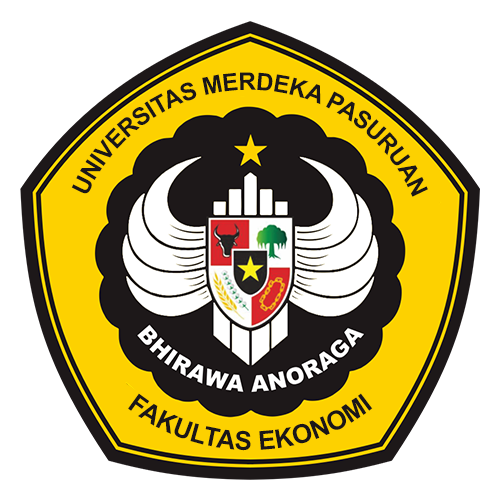Generational Ownership Influence on Family Firm Performance in Indonesia
Abstract
Keywords
Full Text:
PDF (Bahasa Indonesia)References
Anderson, R. C., & Reeb, D. M. (2003). Founding-Family Ownership and Firm Performance: Evidence from the S&P 500. Journal of Finance , 58 (3), 1301–1327. https://doi.org/10.1111/1540-6261.00567
Arifai, M., Tran, A.T., Moslehpour, M., & Wong, W. (2018). Management Science Letters . 8 , 737–754. https://doi.org/10.5267/j.msl.2018.5.011
Bansal, M. (2021). Board independence and earnings management: influence of family firm generation. Journal of Asian Business Studies , 15 (5), 748–768. https://doi.org/10.1108/JABS-07-2020-0280
Basco, R. (2013). The family's effect on family firm performance: A model testing the demographic and essence approaches. Journal of Family firm Strategy , 4 (1), 42–66. https://doi.org/10.1016/j.jfbs.2012.12.003
Chen, J., Zhou, F., He, Z., & Fu, H. (2020). Second-generation Succession and the Financialization of Assets: An Empirical Study of Chinese Family Firms. Emerging Markets Finance and Trade , 56 (14), 3294–3319. https://doi.org/10.1080/1540496X.2019.1695592
Hiebl, M.R.W., & Li, Z. (2020). Non-family managers in family firms: review, integrative framework and future research agenda. In Review of Managerial Science (Vol. 14, Issue 4). Springer Berlin Heidelberg. https://doi.org/10.1007/s11846-018-0308-x
Hillebrand, S. (2019). Innovation in family firms – a generational perspective. Journal of Family firm Management , 9 (2), 126–148. https://doi.org/10.1108/JFBM-04-2018-0011
Jensen, M. C., & Meckling, W. H. (2019). Theory of the firm: Managerial behavior, agency costs and ownership structure. Corporate Governance: Values, Ethics and Leadership , 77–132. https://doi.org/10.2139/ssrn.94043
Kang, J. K., & Kim, J. (2020). Do family firms invest more than nonfamily firms in employee-friendly policies? Management Science , 66 (3), 1300–1324. https://doi.org/10.1287/mnsc.2018.3231
Kellermanns, F.W., & Eddleston, K.A. (2007). A family perspective on when conflict benefits family firm performance. Journal of Business Research , 60 (10), 1048–1057. https://doi.org/10.1016/j.jbusres.2006.12.018
Kellermanns, F.W., Eddleston, K.A., Sarathy, R., & Murphy, F. (2012). Innovativeness in family firms: A family influence perspective. Small Business Economics , 38 (1), 85–101. https://doi.org/10.1007/s11187-010-9268-5
Kowalewski, O., Talavera, O., & Stetsyuk, I. (2010). Influence of family involvement in management and ownership on firm performance: Evidence from Poland. Family firm Review , 23 (1), 45–59. https://doi.org/10.1177/0894486509355803
La Porta, R., Lopez-de-Silanes, F., & Shleifer, A. (1999). Corporate ownership around the world. Journal of Finance , 54 (2), 471–517. https://doi.org/10.1111/0022-1082.00115
Martínez-Alonso, R., Martínez-Romero, M.J., & Rojo-Ramírez, A.A. (2020). Refining the influence of family involvement in management on firm performance: The mediating role of technological innovation efficiency. BRQ Business Research Quarterly . https://doi.org/10.1177/2340944420957330
Meckling and Jensen. (1976). Theory of the firm: managerial behavior, agency costs and ownership structure. Journal of Financial Economics 3 , dern Libra (p. 700), 305-360.
Molly, V., Laveren, E., & Deloof, M. (2010). Family firm succession and its impact on financial structure and performance. Family firm Review , 23 (2), 131–147. https://doi.org/10.1177/0894486510365062
Monterrey, T. De, & Ramirez-solis, E.R. (2019). Mushroom management theory; Sample of health sector Editor Dr. Shawn Carraher University of Texas at Dallas The Academy of Strategic Management Journal is owned and published by Jordan Whitney . January .
Rosen, V., Luddin, MR, & Supriyati, Y. (2019). Succession management success at PT Bakrie Brothers Tbk. Global Business and Organizational Excellence , 38 (5), 18–26. https://doi.org/10.1002/joe.21947
Zhou, H., He, F., & Wang, Y. (2017). Did family firms perform better during the financial crisis? New insights from the S&P 500 firms. Global Finance Journal , 33 , 88–103. https://doi.org/10.1016/j.gfj.2017.01.001
DOI: http://dx.doi.org/10.51213/ema.v10i1.641
Refbacks
- There are currently no refbacks.
Copyright (c) 2025 Eva Mufidah, Heri Cahyo Bagus Setiawan, Yusmiaty Sabang

This work is licensed under a Creative Commons Attribution-ShareAlike 4.0 International License.
____________________________________________________________
Jurnal EMA (Ekonomi Manajemen Akuntansi)
Print ISSN : 2548-9380
Online ISSN : 2549-2322
Published by Universitas Merdeka Pasuruan
Managed by Fakultas Ekonomi, Universitas Universitas Merdeka Pasuruan
Address Jl. Ir. Juanda no.68 Pasuruan
E-mail [email protected]

Jurnal EMA (Ekonomi Manajemen Akuntansi) is licensed under a Creative Commons Attribution-ShareAlike 4.0 International License.
____________________________________________________________




